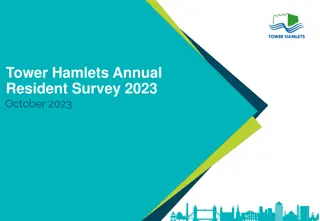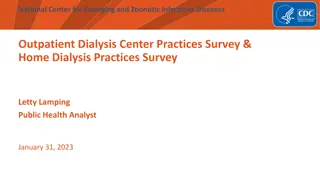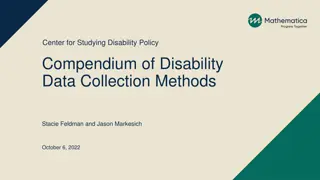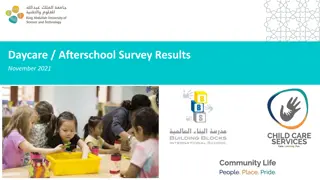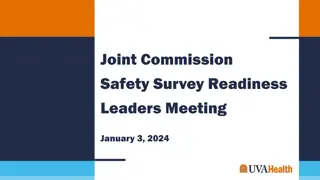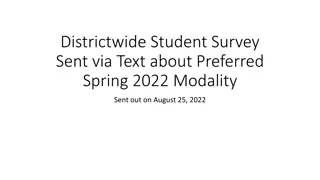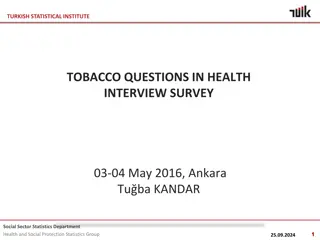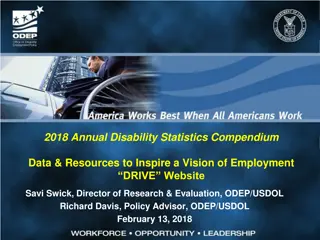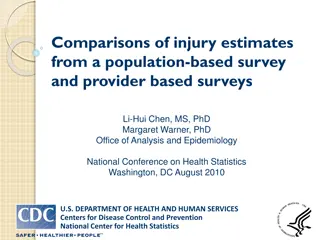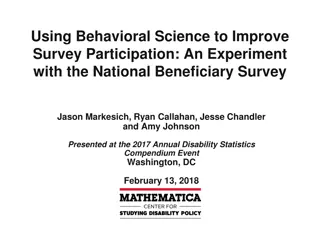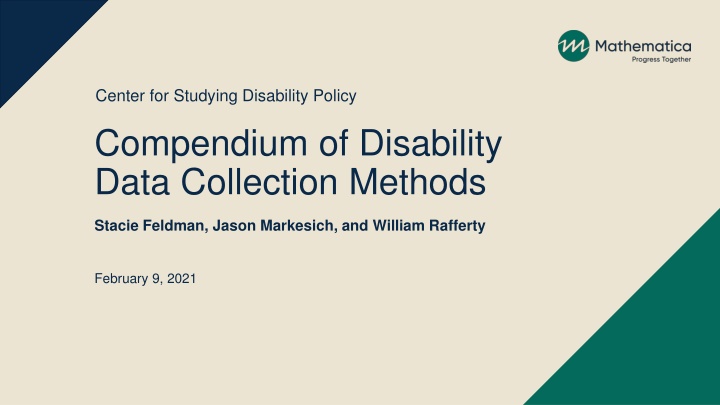
Studying Disability Policy Compendium: Data Collection Methods & Research Questions
Discover the latest insights on collecting data about disabilities in this comprehensive compendium. Explore topics like disability types, data collection, questionnaire design, and more. Stay informed with new research questions addressing crucial issues in the field.
Download Presentation

Please find below an Image/Link to download the presentation.
The content on the website is provided AS IS for your information and personal use only. It may not be sold, licensed, or shared on other websites without obtaining consent from the author. If you encounter any issues during the download, it is possible that the publisher has removed the file from their server.
You are allowed to download the files provided on this website for personal or commercial use, subject to the condition that they are used lawfully. All files are the property of their respective owners.
The content on the website is provided AS IS for your information and personal use only. It may not be sold, licensed, or shared on other websites without obtaining consent from the author.
E N D
Presentation Transcript
Center for Studying Disability Policy Compendium of Disability Data Collection Methods Stacie Feldman, Jason Markesich, and William Rafferty February 9, 2021
Overview Up-to-date and accessible source of information associated with collecting data from or about people with disabilities Includes 441 indexed references published since 2012 Living document; released annually Center for Studying Disability Policy 2
Compendium topics Disability/impairment type Data collection Questionnaire design and measurement Sampling and nonresponse Special populations Ongoing national surveys Center for Studying Disability Policy 3
Compendium development Obtain references from multiple and diverse sources Apply eligibility criteria to specify which references to include in, or exclude from, the compendium - Include resources that discuss, examine, or test methods used to collect data from people with disabilities - Consider resources from all geographic regions in the world for inclusion - Exclude articles for which the full text was not available, accessible, or not published in English Center for Studying Disability Policy 4
New entries address important research questions What are some best practices for interviewing people with dementia? What processes have been used for organizing participatory research involving people with sensory impairments? What are the core constructs that must be measured for identifying people with intellectual and developmental disabilities in national population surveys? Center for Studying Disability Policy 5
New entries address important research questions (cont d) Is it feasible to survey VR applicants online? To what extent does the proxy-sample member relationship affect the differences between proxy and self-reported responses in a large-scale survey of people with disabilities? What are some best practices for recruiting and retaining people with disabilities in qualitative health research? Center for Studying Disability Policy 6
Accessing the compendium NOTE: Will include Mathematica and UNH links here when available Center for Studying Disability Policy 7
For more information Stacie Feldman SFeldman@Mathematica-mpr.com Jason Markesich JMarkesich@Mathematica-mpr.com Center for Studying Disability Policy 8
Funding for this study was provided by the Research and Training Center on Disability Statistics and Demographics at the University of New Hampshire, which is funded by the National Institute for Disability, Independent Living, and Rehabilitation Research in the Administration for Community Living at the U.S. Department of Health and Human Services (DHHS) under cooperative agreement 9ORTGE0001. The contents do not necessarily represent the policy of DHHS, and the reader should not assume endorsement by the federal government (EDGAR, 75.620 (b)). Center for Studying Disability Policy 9

